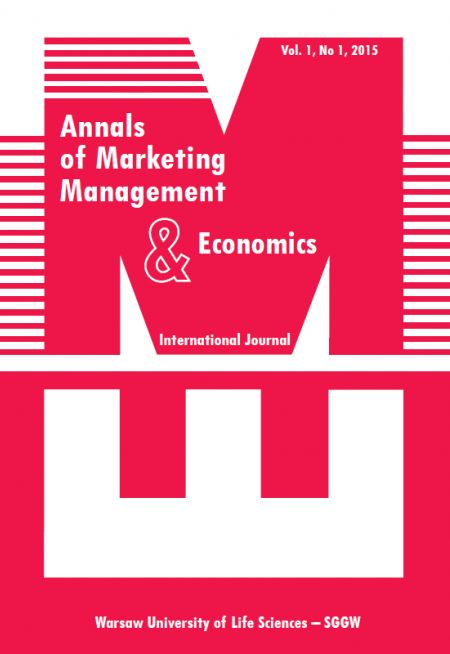Main Article Content
Article Details
Ackoff R.F., Addison H., Magidson J., 2007. Projektowanie ideału (Idealized design), WSiP, Warszawa (in Polish).
Bauman Z., 2006. Płynna nowoczesność(Liquid modernity), Wydawnictwo Literackie, Kraków (in Polish).
Budny M., Pogoda I., Szostakowska M., 2013. Diagnoza dobrych praktyk - metod aktywizacji zawodowej osób w wieku 50+ (Diagnosis of good practices - methods of occupational activation 50+), Wyższa Szkoła Ekonomii i Informatyki, Warszawa (in Polish)
Burrel G., Morgan G., 1979. Sociological Paradigms and Organisational Analysis, Heinemann, London.
GUS, 2014. Prognoza ludności na lata 2014-2050 (Population projection for the years 2014-2050),retrieved from http://efektywni50plus.wwsi.edu.pl/upload/list/Diagnoza dobrych%20praktyk metod aktywizacji zawodowej osob w wieku 50+.pdf [accessed: 01.05.2015] (in Polish).
Council Directive 2000/78/EC of 27 November 2000 establishing a general framework for equaltreatment in employment and occupation, retrieved from http://www.rownetraktowanie.gov.pl/sites/default/files/2000.78.pdf [accessed: 01.05.2015].
Employers practices for active ageing - case studies, 2012. Materials from: conference "Employers Practices for Active Ageing", Brussels, retrieved from http://www.bvoed.de/assets/files/downloads/CEEP/Konf active aging 27.9.12/2012-09-27 Annex_Case studies for conference.pdf [accessed: 01.05.2015].
Giddens A., 2001. Nowoczesność i tożsamość: "ja" i społeczeństwo w epoce późnej nowoczesności (Modernity and self-identity: self and society in the late modern age), Wydawnictwo Naukowe PWN, Warszawa (in Polish).
Ilmarinen J., 2012. Active ageing in the workplace, European Agency for Safety and Health at Work, retrived from https://osha.europa.eu/pl/publications/articles/promoting-active- ageing-in-the-workplace/view [accessed: 01.05.2015].
Kędziora K., Łojowska M., 2010. Zarządzanie wiekiem w pytaniach i odpowiedziach (Age management in questions and answers), retrieved from http://www.kobiety.interwencja prawna.pl/download/zarzadzaniewiekiem.pdf [accessed: 01.05.2015] (in Polish).
Kostera M., 2015. Metody badawcze w zarządzaniu humanistycznym (Research methods in humanistic management). Wydawnictwo Akademickie SEDNO, Warszawa (in Polish).
Kwiatkiewicz A., 2010. Analiza dobrych praktyk dotyczących zarządzania wiekiem w polskich przedsiębiorstwach - studium przypadku (Analysis of age management good practices in Polish enterprises - a case study), retrieved from http://www.parp.gov.pl/files/74/75/76/487/494/9415.pdf [accessed: 01.05.2015] (in Polish).
Liwiński J., 2010. Opis dobrych praktyk dotyczących zarządzania wiekiem w przedsiębiorstwach polskich oraz innych krajów UE (A description of good age management practices in companies in Poland and other EU countries), retrieved from http://www.parp.gov.pl/files/74/75/76/487/494/9417.pdf [accessed: 01.05.2015] (in Polish).
Liwiński J., Sztanderska U., 2010. Zarządzanie wiekiem w przedsiębiorstwie (Age management in the enterprise), retrived from http://www.parp.gov.pl/files/74/87/110/10073.pdf [accessed: 01.05.2015] (in Polish).
Loo van J., 2011. Making the most of mature minds: issues, trends and challenges in making ac-tive ageing a reality (in:) T. Griffin, F. Beddie (eds), Older workers: research readings,NCVER, Adelaide.
Mendel T., 2004. Humanizacja procesów zarządzania w XXI wieku (Humanisation of management processes in the XXI century), "Zeszyty Naukowe Akademii Ekonomicznej w Poznaniu" 48, 27-36 (in Polish).
Muukka H., 2012. An age management challenge: a Study on company knowledge transfer from senior employees to the company utilization, retrived from http://www.theseus.fi/bitstream/handle/10024/43350/Muukka_Heini.pdf?sequence=1 [accessed: 01.05.2015].
PARP, 2010. Instruments Ensemble Training / Team Institutional Support System. Wytyczne PARP: POKL Poddziaáanie 2.1.1. Rozwój kapitału ludzkiego w przedsiębiorstwach - projekty konkursowe (PARP guidelines: HC OP Measure 2.1.1. Development of human capital in enterprises - competition projects) Warszawa (in Polish).
Rudawska A., Szarek M., 2014. Postawy studentów względem pracy zespołowej i ich zespołowa efektywność (The attitudes of students in relation to teamwork and their team effectiveness), "e-mento"r 3 (55), 12-21 (in Polish). (Crossref)
Szcześniak A. (red.), 2013. Dobre praktyki w zarządzaniu wiekiem i zasobami ludzkimi ze szczególnym uwzględnieniem pracowników 50+ (Good practices in age management and human resources with a particular emphasis on workers 50+) Instytut Badań nad Demokracją i Przedsiębiorstwem Prywatnym, Warszawa (in Polish).
Szczucka A., Turek K., Worek B., 2013. Kształcenie przez całe życie. Na podstawie badań zrealizowanych w 2012 roku w ramach III edycji projektu Bilans Kapitaáu Ludzkiego (Lifelong learning. Based on studies conducted in 2012 as part of the third edition of Human Capital in Poland), PARP, Warszawa (in Polish).
Taylor P., 2011. Ageism and age discrimination in the labour market and employer responses (in:) T. Griffin, F. Beddie (red.), Older workers: research readings, NCVER, Adelaide.
Urbanik A. Zarządzanie wiekiem - innowacyjne wykorzystanie zasobów (Age management - innovative use of resources), retrived from http://www.zysk50plus.pl/storage/fck/file/PROJEKT/zarzadzanie_wiekiem_zysk50+_urbanik 1.pdf [accessed:01.05.2015] (in Polish).
Wicki L., Franc-Dąbrowska J. The role of IT systems in supporting logistics systems in agribusiness enterprises. Issues in Information Systems. 2013;14:127–138.
Wiśniewski Z. (ed.), 2009. Zarządzanie wiekiem w organizacjach wobec procesu starzenia się ludności (Age management in organisations in the light of population aging), Studio Kropka, Toruń (in Polish).
Downloads

This work is licensed under a Creative Commons Attribution 4.0 International License.





